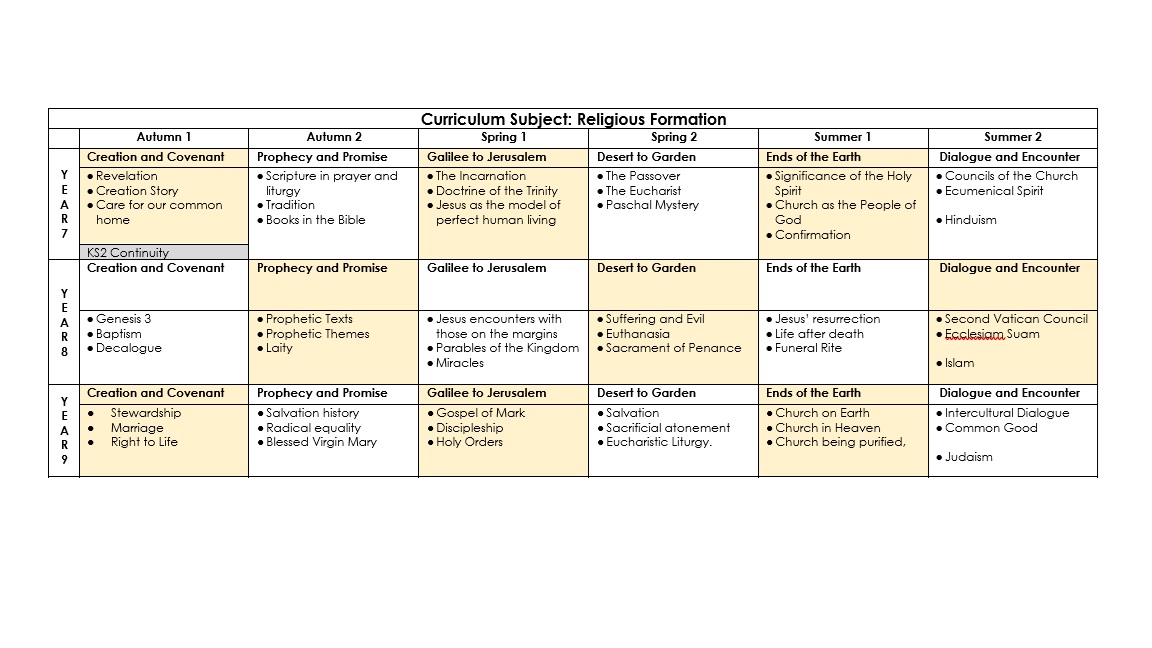
St. Bede's Catholic College

Religious Formation
![]()
Religious Formation
‘Religious education is more than just one subject in the curriculum. In Catholic schools, it is the core of the “core curriculum”’.
(Pope St. John Paul II, 1988)
At the heart of every Catholic school is the person of Jesus Christ. This presence of Christ is in the present tense: it is a real presence, in the here and now. Recognition of it impacts on everything a Catholic school is and does, not least in its religious education.
Religious Formation is the ‘core of the core curriculum’ in a Catholic school (Pope John Paul II),and placing it at the core of the curriculum helps us to fulfil our mission to educate the whole person in discerning the meaning of their existence. Religious Formation is not only concerned with intellectual knowledge “but also includes emotional and affective learning. It is in the mystery of the Word made flesh that the mystery of what it is to be human truly becomes clear. Without religious education, pupils would be deprived of an essential element of their formation and personal development, which helps them attain a vital harmony between faith and culture." (Religious Education Curriculum Directory, p4)
Teachers of Religious Formation
Mr F McCarthy (Leader of Religious Formation)
Miss S Saban (KS3 Lead)
Miss A Mounter
Mr M Hansel
Mrs J Lindsay
Mrs R Parry
Mr N Sutton
Mr J Toffolo
Miss P Bird
Lay Chaplain
Mr K Loud
Our vision for Religious Formation
We endeavour to foster a love of Religious Formation to ensure that when our pupils leave St Bede’s, they will be religiously literate and will reflect spiritually, act ethically, and think theologically in a multi-faith society. It is our aim that they go on to fulfil their mission and have a deep sense of respect, responsibility, and resilience to prepare them for future life as a citizen of God’s world. In addition, we want all our pupils to discern their call as stewards of God’s creation, their role in school, the communities they serve, and the world we live in. We aim for all our students to be strong and committed in the faith of Christ and be active in how they respond to Christ’s call to care for others.
Key Stage 3 Religious Formation
Religious Formation has 10% curriculum time in KS3 based on 5 x 1-hour lessons a fortnight. The Year 7-9 KS3 curriculum follows the new Religious Education Directory launched by the Catholic Education Service (CES) for Catholic schools. Titled ‘To know you more clearly’, the directory sets out the purpose of RE for KS3 and features a programme of study with a model curriculum, which presents the expected outcomes in six curriculum branches. The model curriculum is rooted in the narrative of salvation history. Further information can be found here:
The six curriculum branches are:
1: Creation and Covenant
2: Prophecy and Promise
3: Galilee to Jerusalem
4: Desert to Garden
5: To the ends of the earth
6: Dialogue and Encounter
There are three summative assessments in Terms 1, 3 and 5 for Years 7 and 9, and in Terms 2, 4 and 6 for Year 8.


Key Stage 4 Religious Formation
All pupils follow the Edexcel Specification A GCSE Catholic Christianity syllabus comprising of three papers:
- Paper 1: Catholic Christianity
- Paper 2: Judaism
- Paper 3: Philosophy and Ethics – Catholic Christianity
Religious Formation has 10% curriculum time in KS4 based on 5 x 1-hour lessons a fortnight. End-of-unit tests take place across all three units of study to ensure that pupils are working at least in line with their target grade. Further information relating to the specification can be found here: https://qualifications.pearson.com/en/qualifications/edexcel-gcses/religious-studies-a-2016.html

KS5 Religious Studies
At A-level, those pupils who study the course follow the Edexcel specification A syllabus. Pupils are taught for 9 hours a fortnight in Year 12, and 8 hours in Year 13. The course is taught by two teachers. Over the course of two years, they study the following components:
- Philosophy of Religion
- Religion and Ethics
- New Testament
All pupils are set regular essays at the end of each unit of study to check their knowledge and understanding. Home learning takes the form of weekly reading and completion of tasks in preparation for the following lesson. They are expected to deepen their knowledge and understanding through independent study and show evidence of wider reading in their written work. The sections highlighted in green and yellow are the topics students will study in Years 12 and 13 respectively. Further information relating to the A-level course can be found here:
![]()
Sixth Form Core RE
All students in the Sixth Form take the Core RE course and are taught two periods a fortnight (5% curriculum time) which is in line with Bishops’ requirements. It is a compulsory, non-examined subject.
The aims and objectives of the course are as follows:
- To continue to support and advance the religious and moral formation of the students.
- To inspire Gospel values in the hope that all students will be motivated by a positive self-image as they attempt to come to terms with their advancement in wisdom, age and grace.
- To enable all pupils to develop critical thinking skills, independence and moral growth.
- To ensure that the educational rigour of the course is combined with the necessary freedom for spiritual enquiry.
Students are presently following the Sycamore programme which is a course designed to explore and learn more about the Christian faith and its relevance for life today. Further information about what students study can be found here:
https://www.sycamore.fm/pathways/d-school-pathways/religious-studies-etc/
After the Sycamore programme, pupils will cover topics including medical ethics, Catholic Social Teaching and Human Trafficking.
